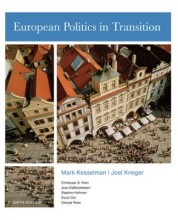Summary: European Politics In Transition | 9780618870783 | Mark Kesselman
- This + 400k other summaries
- A unique study and practice tool
- Never study anything twice again
- Get the grades you hope for
- 100% sure, 100% understanding
Read the summary and the most important questions on European politics in transition | 9780618870783 | Mark Kesselman ... [et al.].
-
1 Britain
-
1.1 Making the Modern British State
This is a preview. There are 12 more flashcards available for chapter 1.1
Show more cards here -
What significance does the geographic position of Britain have?
Britain is an island and therefore less subject to conquest and invasion than its continental counterparts, offering a sense of security.It has also created a feeling among Britons that they are both apart from and a part of Europe, a factor that has complicated relations with Britain's EU partners to this day. -
With what Act and when did a common Parliament of Great Britain replace the two seperate parliaments of Scotland and of England and Wales?
With the Act of Union in 1707. -
When was the King forced to consent to the Magna Carta and what was it?
In 1215. The Magna Carta was a series of concessions that protected feudal landowners from abuses of royal power. It was an historical statement of a political community against the monarchical state. -
When was the term parliament first used and what was it for?
The term parliament was first used in 1236 to refer to the gathering of feudal barons summoned by the king whenever he required their consent for special -
When did Parliament gain the right to make laws?
By the fifteenth century -
When and what was the Glorious Revolution?
It was a political revolution in 1688 that forced the abdication of James II. It marked the "last succesful political coup d'état or revolution in British history" -
Why did England take a more secular turn than most other countries in Western Europe?
Because it resolved its religious differences early by replacing James II by the Protestant William and Mary, which ensured the domincance of the Church of England, or Anglican Church. Whic is, to this day, the established religion of England. -
Since when did Parliament hold the sole authority for taxation and the maintenance of a standing army?
Since the seventeenth century. Since this period Britain's monarch's have had to answer to Parliament as well. -
Why has the United Kingdom remained free of the pattern of mulitple parties?
Because the Party System in the United Kingdom has traditionally reflected class distinctions instead of both class and religious distinctions. -
What were the consequences of the Industrial Revolution?
1. Rapid expansion of manufacturing production and technological innovation.2. Monumental social and economic transformations3. Created pressures for democratization4. Created a competitive edge for Britain to transform and dominate the international order.
- Higher grades + faster learning
- Never study anything twice
- 100% sure, 100% understanding
































